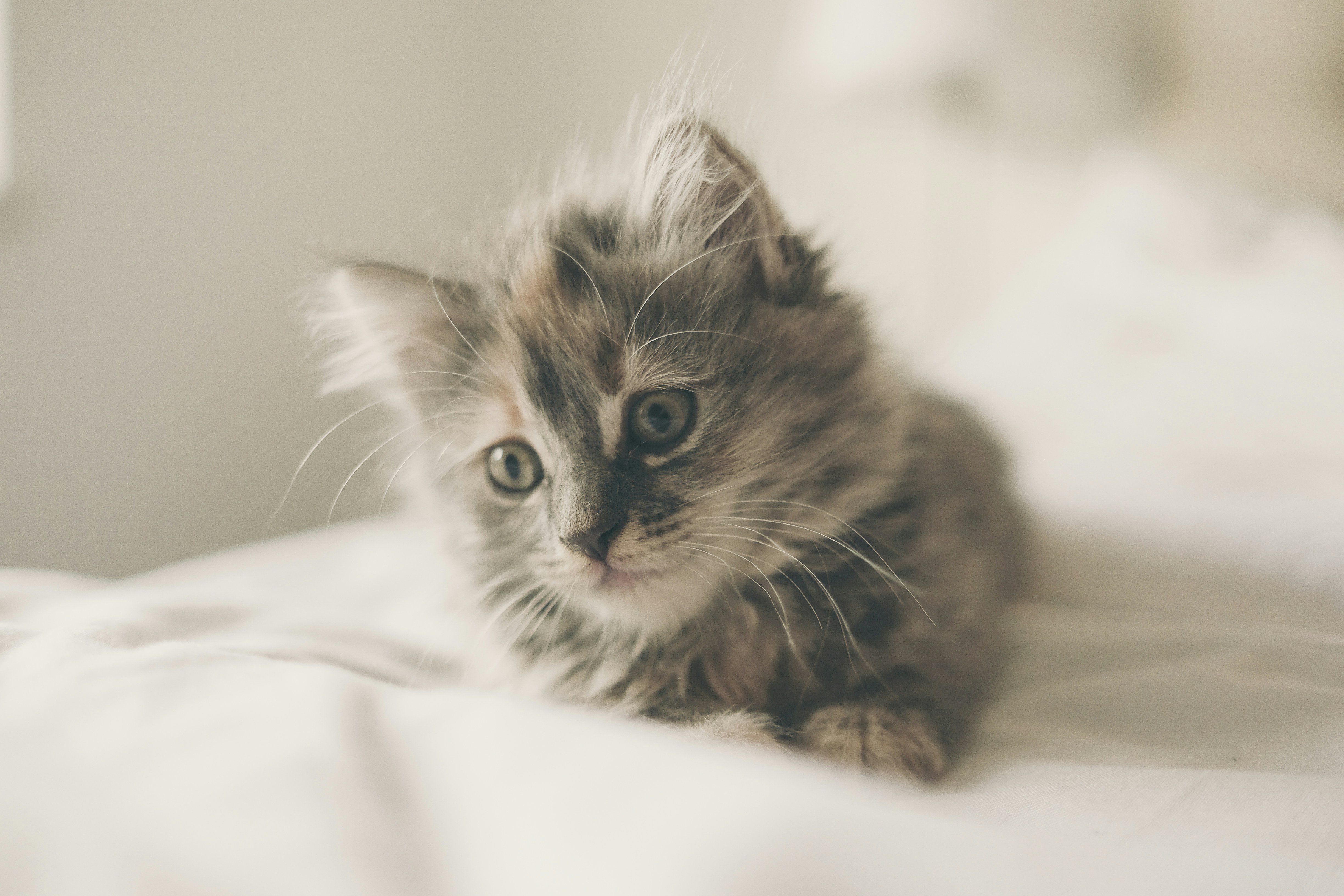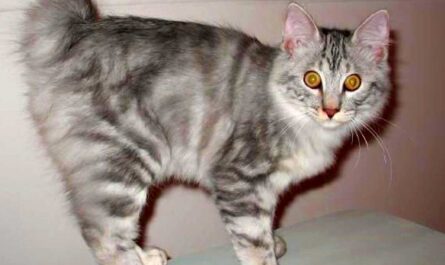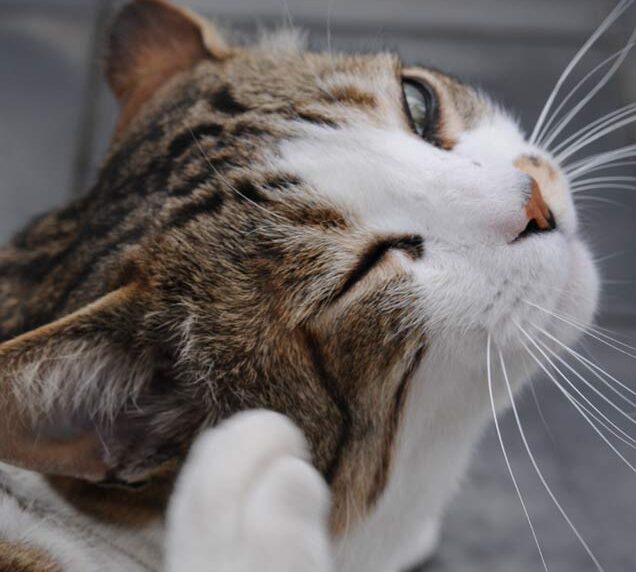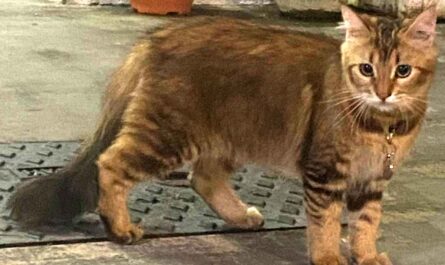Fading Kitten Syndrome: Age, Causes, Symptoms, Treatment. Imagine the joy of welcoming a litter of playful, curious kittens into your home. Their tiny meows, soft fur, and energetic exploration fill your days with sunshine and purrs. However, amidst the excitement, there’s a crucial reality to be aware of: the first few weeks of life are a critical period for these fragile bundles of fur, a time when they are most susceptible to a condition known as Fading Kitten Syndrome (FKS).
Understanding FKS, its causes, and early intervention is crucial for ensuring the survival of these precious newborns. This article will serve as your guide, offering insights into the age vulnerability of kittens, potential causes of FKS, recognizable signs, and treatment options. By equipping yourself with this knowledge, you can become a champion for your feline companions, creating a safe and supportive environment for them to thrive.
Understanding the Fragile First Weeks: When is a Kitten Most Vulnerable?
The initial weeks of life, from birth to weaning (around 4-6 weeks), are a delicate dance for kittens. During this time, their tiny bodies are undergoing rapid development, laying the foundation for a healthy and independent future. Imagine a tiny astronaut venturing onto a foreign planet for the first time – that’s essentially what a newborn kitten experiences as they adjust to life outside the womb.
Just like astronauts need specialized suits and training to adapt to a new environment, kittens need extra support during this vulnerable period. Their bodies are still learning to regulate their temperature (thermoregulation), their immune systems are still developing, and they rely heavily on their mother’s milk for essential nutrients and antibodies.
Compared to adult cats, kittens have a higher body surface area to mass ratio, making them lose heat more quickly. Their immature immune systems are also susceptible to various infections and illnesses. These factors combined make them more vulnerable to the complications associated with FKS.
Understanding this critical stage in a kitten’s life is the first step towards providing them with the care and support they need to overcome challenges and blossom into healthy, playful companions. In the next section, we’ll delve deeper into the potential causes of FKS, equipping you with the knowledge to identify potential risks and intervene promptly.
The Invisible Threads: Unveiling the Causes of Fading Kitten Syndrome
Unlike a single, easily identifiable cause, FKS often arises from a complex interplay of factors, making it challenging to pinpoint a single culprit. Imagine a talented detective working on a case with multiple interconnected clues. Similarly, veterinarians work diligently to unravel the underlying cause of FKS by considering various possibilities.
Here are some of the common threads that might be woven into the tapestry of FKS:
-
Hypothermia: Just like human babies, kittens cannot regulate their body temperature effectively, especially in their first few weeks. This vulnerability to cold environments can lead to hypothermia, a condition where the body temperature drops below a safe level. This can occur due to inadequate bedding, drafts, or separation from their mother.
-
Hypoglycemia: Think of hypoglycemia as a situation where the body’s sugar levels, also known as glucose, dip below the normal range. This lack of readily available energy can be detrimental to a kitten’s growth and development. Insufficient milk intake due to maternal neglect, difficulty feeding, or underlying health issues can contribute to hypoglycemia.
-
Infection: Tiny bodies are more susceptible to various infections, including viral, bacterial, and parasitic. These invaders can wreak havoc on a kitten’s developing immune system, impacting their overall health and growth, and potentially leading to FKS.
-
Congenital Defects: In some cases, kittens might be born with certain birth defects or abnormalities. These can range from minor issues to more serious conditions requiring immediate veterinary intervention. While not always directly related to FKS, congenital defects can sometimes contribute to its development.
-
Maternal Neglect: Unfortunately, some mothers might not be able to care for their kittens properly. This lack of maternal care, encompassing aspects like inadequate feeding and cleaning, can weaken a kitten’s immune system and contribute to FKS.
It’s important to remember that this list is not exhaustive, and other factors like internal bleeding or genetic predisposition might also play a role. However, focusing on controllable factors like environmental temperature and providing adequate nutrition can significantly impact a kitten’s well-being.
By being aware of the potential causes of FKS, responsible pet owners can create a nurturing environment for their feline companions and seek timely veterinary help if needed. Remember, early detection and intervention are crucial for increasing a kitten’s chances of a healthy and happy life.
Recognizing the Signs: Early Detection is Key to Saving Lives
Fading Kitten Syndrome typically affects newborn kittens during their most vulnerable period, from birth to weaning (usually around 4-5 weeks of age). Early detection and intervention are vital for improving the chances of a kitten’s survival. Here’s what you need to watch out for:
Behavioral Changes
These subtle changes in a kitten’s behavior might indicate FKS:
- Lethargy and weakness: A normally playful kitten who appears listless, lacking energy, and struggling to move could be a cause for concern.
- Decreased appetite or refusal to nurse: Kittens who lose interest in feeding or struggle to nurse from their mother may not be getting the vital nutrients they need.
- Excessive crying or vocalization: While some vocalization is normal in kittens, persistent crying or whimpering could be a sign of discomfort or distress.
- Difficulty moving or breathing: Notice any abnormal breathing patterns, shallow breaths, or difficulty walking or standing.
- Abnormal body temperature: Kittens should have a warm body temperature, typically around 100°F (37.8°C). Feeling cold or unusually hot can be a red flag.
Physical Signs
These physical changes in a kitten’s appearance might also signal FKS:
- Dull eyes and sunken appearance: A kitten’s eyes should be bright and alert. Dullness or sunken appearance can indicate dehydration or illness.
- Dehydration and pale mucous membranes: Check the gums and inner eyelids for a healthy pink color. Pale or white gums can indicate dehydration.
- Unkempt fur and weight loss: A healthy kitten’s fur should be clean and fluffy. Notice any matted fur, excessive shedding, or weight loss.
Encourage Vigilance
During these first few weeks, it’s crucial to monitor your kittens closely, checking for any changes in behavior or appearance. If you notice any of the signs mentioned above, don’t hesitate to seek immediate veterinary attention. Early diagnosis and treatment can significantly increase a kitten’s chances of a full recovery.
Remember, being proactive, observant, and seeking professional help when needed can significantly contribute to your kitten’s well-being and offer them the best chance to thrive. In the next section, we’ll explore the potential causes of FKS to gain a deeper understanding of this condition.
A Beacon of Hope: Treatment Options for Fading Kittens
The first few weeks of life are a critical time for kittens. While they may appear healthy and playful in one moment, they can quickly develop Fading Kitten Syndrome (FKS). If you suspect your precious kitten might be fading, seeking immediate veterinary help is crucial.
Think of your veterinarian as a superhero in a white coat. They possess the knowledge, skills, and resources to diagnose the underlying cause of FKS and provide the best possible care for your tiny friend. Every minute counts, so don’t hesitate to reach out and get your kitten the expert attention they need.
Working Together for Your Kitten’s Wellbeing
Once your veterinarian has thoroughly examined your kitten, they can recommend the most appropriate treatment plan based on the identified cause(s) of FKS. Here are some potential treatment options your veterinarian might consider:
-
Temperature stabilization: Keeping a fading kitten warm is critical. Your veterinarian might use special heating pads, blankets, or incubators to ensure their body temperature remains within a safe and healthy range. Imagine a tiny, shivering kitten snuggled in a cozy, warm environment, slowly regaining their strength and energy.
-
Nutritional support: Dehydration and low blood sugar are common concerns with FKS. Your veterinarian might administer fluids through injections or an IV (intravenous) drip to keep your kitten hydrated. They might also recommend offering sugar water or a special kitten formula to help stabilize their blood sugar levels. Just like a wilted flower perks up with a refreshing drink, this additional support can give your kitten the crucial boost they need.
-
Antibiotics or medication: If an underlying infection is contributing to FKS, your veterinarian might prescribe antibiotics or other medications to combat it. Imagine these medications as tiny warriors fighting off harmful invaders, helping your kitten’s body heal and recover.
-
Nutritional guidance: Once your kitten starts showing signs of improvement, your veterinarian will educate you on the proper feeding practices to ensure they receive the essential nutrients they need to thrive. This guidance might involve special kitten formulas, feeding schedules, and proper hygiene practices to maintain a clean feeding environment. Proper nutrition acts like a magic potion, giving your kitten the building blocks they need to grow strong and healthy.
-
Supportive care: Depending on the specific needs of your kitten, your veterinarian might recommend additional supportive measures like oxygen therapy, pain management, or specialized wound care. These interventions can help your kitten feel more comfortable and create the optimal environment for healing and recovery.
Embracing Hope with Realistic Expectations
While these treatment options offer a ray of hope, it’s important to understand that not all kittens with FKS can be saved. Early intervention, however, significantly improves their chances of survival and recovery. By acting swiftly and seeking professional veterinary help, you’re giving your kitten the best possible fighting chance. How AI, ChatGPT maximizes earnings of many people in minutes
Remember, even if the outcome isn’t what you hoped for, know that you did everything you could to help your tiny friend. You provided them with love, care, and access to the best medical expertise available.
Nurturing the Fighters: Post-Recovery Care and Prevention Strategies
Witnessing your tiny kitten struggle with Fading Kitten Syndrome can be a heart-wrenching experience. However, with prompt intervention and dedicated care, many kittens can overcome this challenge and grow into healthy, happy felines. Here’s what you can do to support your recovering kitten and help prevent future cases:
Continued Monitoring: A Watchful Eye on the Road to Recovery
Even after your kitten starts showing signs of improvement, it’s crucial to continue monitoring them closely for any setbacks. Remember, Fading Kitten Syndrome can be unpredictable, so vigilance is key. Here’s what to watch for:
- Changes in appetite: A healthy appetite is a positive sign, so if your kitten loses interest in feeding, it could indicate a returning issue. Motivation – Mind – Success – Thinking – Productivity – Happiness
- Energy levels: While they might still be recovering, they should gradually regain their playful spirit and energy. Lethargy or weakness could signal a problem.
- Stool and urination: Monitor the consistency and frequency of your kitten’s bathroom habits. Changes could indicate underlying issues.
- Temperature: A healthy kitten’s body temperature typically falls between 99 and 102 degrees Fahrenheit. If their temperature drops again, seek immediate veterinary attention.
Strengthening Immunity: Building a Fortress of Health
Just like human babies, newborn kittens have developing immune systems, making them more susceptible to illnesses. Here are some ways to support your kitten’s immune system during recovery and beyond:
- Vaccinations: Discuss a vaccination schedule with your veterinarian and ensure your kitten receives the recommended vaccinations at the appropriate ages to protect them from common feline diseases. Business – Money Making – Marketing – E-commerce
- Proper hygiene: Maintaining a clean environment, including their bedding, food and water bowls, and litter box, helps prevent the spread of germs and promotes overall health.
- Nutritious diet: Consult your veterinarian about providing a kitten-specific formula rich in essential nutrients to support their growing body and developing immune system.
- Minimize stress: A calm and stress-free environment is crucial for any recovering animal. Avoid introducing new pets or loud noises during their recovery period.
Preventive Measures: Protecting Your Tiny Guardians
While Fading Kitten Syndrome can be unpredictable, there are steps you can take to minimize the risk of it occurring in future litters:
- Selecting healthy breeding cats: When considering adopting a kitten, inquire about the parents’ health history. Responsible breeders prioritize the health of their breeding cats and screen them for genetic conditions linked to FKS.
- Prenatal and postnatal care: Providing proper care for the mother cat during pregnancy and after birth is essential. This includes ensuring she receives proper nutrition, regular veterinary checkups, and a clean and comfortable environment. Health books, guides, exercises, habits, Diets, and more
- Warm and clean environment: Maintain a warm and clean environment for the kittens. This helps regulate their body temperature and reduces the risk of exposure to harmful germs.
- Responsible breeding and spaying/neutering: Supporting responsible breeding practices and considering spaying or neutering your cat helps control pet populations and potentially reduces the risk of genetic conditions associated with FKS.
Remember, early detection and intervention are crucial in overcoming Fading Kitten Syndrome. By providing prompt medical attention, nurturing care, and taking preventive measures, you can help your tiny fighter not only recover but thrive in their journey to become a healthy and happy adult cat.
Beyond the Individual: The Broader Impact of Fading Kitten Syndrome
Fading Kitten Syndrome (FKS) isn’t just a medical concern; it has a ripple effect that extends beyond the individual kitten. Understanding these broader impacts can help us appreciate the importance of responsible pet ownership and support for animal welfare organizations. Fitness – Meditation – Diet – Weight Loss – Healthy Living – Yoga
Emotional Toll: Carrying the Weight of Loss
Losing a kitten to FKS can be a deeply emotional experience for everyone involved. Breeders who dedicate their hearts and efforts to raising healthy kittens may feel a profound sense of grief and responsibility. Owners who were eagerly anticipating welcoming a furry friend into their lives can experience heartbreak and disappointment. Even animal shelters and rescue organizations, accustomed to caring for vulnerable animals, can be deeply affected by the loss of a young life.
Ethical Considerations: Breeding with Compassion
The potential for FKS underscores the importance of responsible breeding practices. Breeders who prioritize genetic screening, proper nutrition, and optimal care for their breeding cats can significantly reduce the risk of FKS in their kittens. Additionally, responsible breeders will be transparent about the health of their cats and kittens, allowing potential owners to make informed decisions. RPM 3.0 – 60% CONVERSION & Money for Affiliate Marketing
Advocacy and Awareness: Taking Action Together
By advocating for responsible breeding practices and supporting organizations dedicated to feline welfare, we can collectively work towards minimizing the impact of FKS and improving the lives of all cats. Here are some ways you can get involved:
- Educate yourself: Learn about responsible breeding practices and reputable breeders in your area.
- Support ethical breeders: Choose breeders who prioritize genetic testing, proper care, and transparency about the health of their cats and kittens.
- Adopt, don’t shop: Consider giving a loving home to a cat in need by adopting from a shelter or rescue organization.
- Donate to feline welfare organizations: These organizations provide essential care and support to cats in need, including those affected by FKS.
- Spread awareness: Share information about FKS and responsible pet ownership with friends, family, and your local community.
By taking these steps, we can create a future where every kitten has the chance to thrive and experience a life filled with love, joy, and good health. Cat accessories on Amazon
Remember, even though FKS can be a challenging topic, there’s always hope. By working together, we can create a brighter future for cats and ensure they receive the care and compassion they deserve.
Additional Resources
- The American Society for the Prevention of Cruelty to Animals (ASPCA): https://www.aspca.org/
- The Kitten Lady: http://www.kittenlady.org/
- The Cornell University College of Veterinary Medicine: https://www.vet.cornell.edu/
By working together with your veterinarian and staying informed through reliable resources, you can navigate this challenging time with knowledge, compassion, and hope.
Please note: This article is for informational purposes only and should not be substituted for professional veterinary advice. If you have any concerns about your kitten’s health, always consult a qualified veterinarian immediately.
Other Interesting Articles
- How to Make Your Cat Really Happy: 29 Tips You May Try
- How to Train Your Cat to Stop Urine Marking? 12 Tips
- How Do Cats Communicate Each Other? 11 Body Language
- 24 Ways To Know If You Have An Extremely Happy Cat
- What Smells Do Cats Hate: 34 Scents You Must Avoid
- Everything You Need To Know About Cat Territory Marking
- 12 Reasons Why You Should Adopt A Second Cat
- 12 Reasons Cats Pee Outside the Litter Box: How To Solve
- 14 Reasons Why Cats Overgroom: Surefire Ways To Stop It
- Why is My Cat So Clingy? 13 Common Signs: 9 Caring Tips
- Is Your Cat Bored? 12 Common Signs: What You Can Do
- Stress in Cats: Causes, Symptoms, Remedies, Treatment
- 17 Common Signs Your Cat is Lonely: 10 Tips To Help Recover
- 14 Reasons My Cat is Acting Strange & Scared: What to Do?
- How Do Cats Hunt Their Prey, Mice, Bird, Fish, Rat For Food?
- How To Introduce A New Kitten To An Older Cat: 16 Tips
- 15 Reasons Why Do Cats Lick and Groom Each Other
- Domesticated Cats And Big Cats: 24 Similarities, Differences
- 21 Interesting Facts You Should Know About Feral Cats
- How to Socialize a Feral Kitten in 10 Simple Steps




